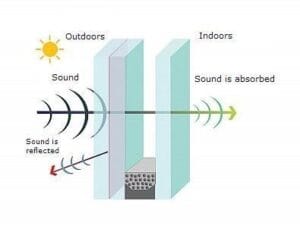Soundproof glass works by creating a near-impenetrable barrier between the sound and your ears. It takes on the mechanical energy of the sound wave and captures it. Such material can block between 90 to 95% of most sounds, with only a few frequencies as an exception.
To block any noise, you need to fulfill five principles of soundproofing. These are:
Mass – Mass reduces noise by making it harder for sound to penetrate.
Mechanical Isolation – With mechanical isolation, it separates the materials from each other, forcing the sound to move through the air.
Absorption – Materials with strong absorption capabilities will eliminate a good chunk of the sound wave’s energy. Soft surfaces soak up the energy of the sound.
Resonance Dampening – With resonance dampening, your material reduces the magnitude of the sound. Most dampeners convert the mechanical energy into something else, whether it’s into heat or something else.
Conduction – By reducing conduction through dampening materials, you can help dissipate as sound travels.

